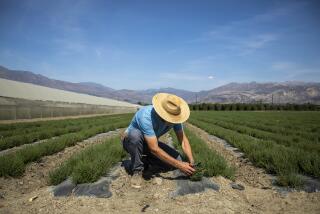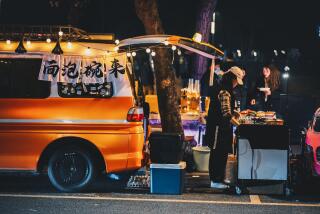China’s taste for organic is growing
BEIJING — Unlike most farms in China, no heaps of blackened sewage sludge are piled on the fields at the Green Cow farm. No workers spray pesticides from pumps strapped to their backs. No animals are in quarantine.
An oasis in a Beijing suburb, the organic farm’s modest 6 acres boast pepper and tomato plants, fields of corn and wheat, and sunflower patches that pop up in between. Two rotund cows chomp on grasses; under a grove of fruit trees, three young pigs slurp water.
Restaurateur and environmentalist Lejen Chen started Green Cow with her husband in 2004, fearful of the pesticides, chemical fertilizers and sewage sludge used in the cultivation of most domestic produce.
In China, the organic food movement is growing steadily, led by Chen and a small, dedicated group of like-minded farmers. It’s a battle in a country of recurring food scares, loosely enforced regulations and skepticism about paying more for produce that looks the same as regular market fare. But interest in natural food is on the rise.
“The Chinese people are very aware that their food is rubbish,” said Romuald Pieters, director of Sustainable Development & Agriculture Creation, a consulting firm operating in China, where the shock of last year’s contaminated-milk scandal still stings.
Conforming to organic standards when you have no control over neighbors’ practices, or what rains down on you, is difficult. But on paper, China’s organic farming standards are strict enough, Chen says.
The problem, she says, is making sure that farmers stick to those standards, and ensuring that there are enough authorities to adequately monitor producers who claim their food is organic -- a tall order in a country where toxic, heavy-metal-filled sewage sludge is the cheapest, most easily accessible fertilizer around.
Though one might wonder what could be more organic than excrement, medical waste and factory runoff also make their way into sewer systems. Not limited to China, the use of toxic sludge fertilizer is a widespread problem, seen in the U.S. and elsewhere.
The Chinese Ministry of Agriculture certifies organic products, and its popular “Green Food” label, which designates food produced with restricted amounts of agricultural chemicals, can be seen on products such as fruit, noodles, tea and even beer. The ministry also labels genetically modified food, something the United States does not do.
Though even prosperous locals often pride themselves on thriftiness, in light of recent food scares many are seeking out organic products from suppliers they can trust.
Perhaps the epitome of this mentality is Chen’s Community-Supported Agriculture program. Fifteen families receive baskets of fresh seasonal vegetables, and have access to the Green Cow farm, about 20 miles from the center of Beijing, as a leisure spot.
The privilege of a year’s involvement with the program costs roughly $45 a week, and families are also expected to help out with chores such as weeding and harvesting at least three times a year. The farm’s crops go to program participants, and are also used to supply Chen’s New York-style diner nearby.
“It’s about proximity and confidence,” Pieters said. “You know the person farming, you know how they produce, and you’re ready to pay more for these high-quality vegetables.”
Chen, who was born in Taiwan to southern Chinese parents and raised in Brooklyn, was not the only one to see a demand for healthy, safe food. Taiwanese entrepreneur Terry Yu runs Lohao City, a successful health-food chain store with seven locations in Beijing and two in Shenzhen.
Yu, a former IT specialist, opened his first shop in 2006, stocking its produce bins exclusively with organic fruit and vegetables from his own ranch. Now Yu has three organic farms around Beijing, which he invites customers to inspect at any time -- an inspiring move in an industry where customer trust is a deciding factor.
“The biggest problem in the Chinese food industry,” Yu said, “is that customers don’t trust the chain, and the chain doesn’t trust its supplier -- no one trusts anyone.”
Large-scale supermarkets such as the popular French chain Carrefour suspend informational posters over their organic produce, tracing the vegetables’ journey from farm to store. Staff members are stationed alongside to help patrons pick the choicest items and answer any questions.
Chen believes that certifications such as the “Green Food” label are helping foster excitement about eating natural food. Unfortunately, she notes, many still confuse “green,” the low-chemical designation, with organic.
Although shoppers’ enthusiasm may run high, organic agriculture will need to expand, and become more accessible, before being embraced by the skeptical penny-pincher.
“There’s just not enough organic food in China right now” to go around, Chen said. “And people aren’t growing it.”
--
Frank is a Times staff writer.
More to Read
Sign up for Essential California
The most important California stories and recommendations in your inbox every morning.
You may occasionally receive promotional content from the Los Angeles Times.










